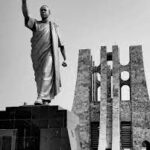ACCRA, Sept 18 – Hackman Owusu-Agyeman, chairman of the New Patriotic Party’s (NPP) Council of Elders, cautioned that declaring a state of emergency would not, by itself, curb Ghana’s escalating illegal mining crisis, known locally as galamsey, without a comprehensive strategy in place.
Owusu-Agyeman’s remarks during an interview on Joy News’ PM Express, come as public outcry intensifies over the environmental devastation wrought by galamsey, which has polluted major rivers, destroyed farmlands and threatened public health in Africa’s top gold producer. He emphasized the need for “clear steps and measurable outcomes” rather than reactive measures, warning that an emergency declaration absent a detailed plan could exacerbate the problem rather than resolve it.
“I don’t think just saying, declare an emergency, per se, in the situation. But if there are other steps before that, then let’s quickly go through them to see whether we can resolve,” Owusu-Agyeman said, adding that Ghana may not yet have reached the threshold for such drastic action. The 83-year-old former parliamentarian and ex-minister of foreign affairs, who has served as NPP elders’ chairman since 2020, has long advocated for structured reforms within his party and beyond.
The comments underscore deepening divisions over how to tackle galamsey, a small-scale, often unregulated gold mining practice that has surged since the 2010s amid economic hardships and weak enforcement. The activity, which employs hundreds of thousands but releases toxic mercury and cyanide into waterways, has rendered the Pra, Ankobra and Tano rivers nearly unusable for drinking, according to environmental reports from groups like the World Bank and Ghana’s Environmental Protection Agency. Farmlands across regions like Ashanti and Western have been bulldozed, displacing farmers and contributing to food insecurity, as highlighted by the Peasant Farmers Association of Ghana.
President John Dramani Mahama’s administration, which took power in January after a landslide win, faces mounting criticism for its perceived slow response. In a recent media encounter, President Mahama stated that Ghana had “not exhausted the powers available” without an emergency declaration, stressing the need for sustainable enforcement and collective action. Minister of Government Communications, Felix Kwakye Ofosu, reiterated has also re-echoed that such a measure remains “on the table” as an extraordinary tool but is not yet warranted, amid ongoing operations to transfer police commanders in galamsey hotspots and strengthen regulations.
Opposition voices, including the NPP, have been vocal. The party’s Communications Director, Richard Ahiagbah, has called on President Mahama to declare an emergency or risk being seen as complicit, proposing four specific steps like enhanced prosecutions and alternative livelihoods for miners.
Also, civil society groups, such as the Ghana Coalition Against Galamsey, have slammed the government for “downplaying the severity” of the crisis, demanding immediate action to protect water sources and ecosystems. The FixTheCountry Movement plans vigils and protests on Sept. 21-22 to press for bolder and sustainable interventions.
Mr. Owusu-Agyeman’s intervention adds a measured tone to the debate, drawing on his experience as a former agricultural economist with the Food and Agriculture Organization and Ghana’s Ministry of Agriculture in the 1960s and 1970s. Some contend his stance reflects broader concerns that galamsey, fueled by global gold demand and local poverty, requires not just enforcement but investments in formal mining and rural development to avoid political backlash in a nation where the sector accounts for over 90% of gold output.




